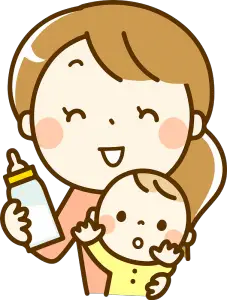Table of Contents
What weaning means
Sometimes, there is a misconception on the true meaning of weaning. Weaning does not necessarily mean getting off of milk or stopping altogether. In a real sense, weaning actually starts when your baby starts consuming any other meal aside from breast milk or formula milk.
The weaning process may vary from child to child; that is why it is vital that you pay great attention to how your child responds to changes in their diet and intake. However, experts commonly suggest starting gradually weaning your babies at the age of six months. Weaning eventually ends when your little ones have their diets completely replaced by solids and other drinks.
How to wean from baby formula
Similar to transitioning from breast milk to formula, there are also different techniques or strategies that you can take
Partial weaning
Partial weaning is best if you are still finding the best whole milk during the transition phase or if you’re planning to go through slowly with the process. This works by giving them formula milk during the favorable parts of the day and giving them small amounts or letting them try whole milk in between. For this weaning strategy, it is also recommended that you try a few different brands or types of whole milk, so that you can identify which brand of milk that will be preferred by your baby.
Gradual weaning
Gradual weaning is best if you have observed that your baby is entirely ready to switch to whole milk. This weaning strategy works through slowly incorporating the new milk into the old milk. It is generally recommended to carry out the transition for over a few weeks. A smooth and slow transition allows your baby’s teeny tiny digestive system to make the necessary adjustments to take in the new milk. You can follow a particular transition schedule through mixing formula milk with whole milk in gradually increasing ratio, and observe how your little one reacts to the new milk.
Go Cold Turkey
An instantaneous switch might not be a good idea, but it sure is needed for some instances. However, if you notice that there are no adverse effects towards your baby then going cold turkey might work for you!
Is your baby ready to transition away from the formula?
As a parent, there will always be signs and observations that you can be sure of when it comes your little one’s readiness to start with toddler formula or whole milk. These are the signs that will give you a hint that your baby is finally ready to stop and transition away from the best baby milk formula that you’ve chosen.
- By the time your child reaches the age of twelve months, his digestive system and kidneys will now then be ready for whole milk or next stage milk. If you want to start switching at an earlier age, you may wish to consult your pediatrician first. However, plenty of babies already start changing at the period of ten months.
- It is essential that your little one already has an established diet where they may be able to acquire the nutrients they need.
Has already tried a wide variety of nutritious meals, or have been attempting a healthy balance of processed baby food that includes fruits, vegetables, protein, etc.
- Caloric intake also matters; it is vital that your child can consume an approximate 1000 calories to avoid deficiency. Your babies have to have all the energy they need!
- If your baby isn’t having much of a hard time anymore when it comes to changes and improvements and dietary intake, it is also a good sign that your little one is definitely ready to transition away from formula.
- If you are not confident enough to stop baby formula, it is always good to consult your pediatrician. They will help you ensure that your little one is getting enough nutrients even after being wholly weaned off from the formula.
When to stop baby formula
At twelve months, your little one will now be ready to stop baby formula and start consuming whole milk and healthy solids. The American Academy of Pediatrics highly recommends that in the year between twelve to twenty-four months, your baby should begin to wean off from baby milk formula and start consuming whole milk, cow’s milk, or next stage toddler formula.
Once your babies are already a year old, it is safe to say that they have a well-developed digestive system that can digest whole milk and other solids. By this time, babies’ kidneys will also be developed enough to process intake, other than formula milk, healthily and adequately.
It is also vital that you wean them off from baby formula once they turn twelve months old or until they are ready since different beverages and meals play an essential part in a healthy diet. This way, your little one will not be solely dependent on formula milk so they can meet their nutritional needs.
Exceptions
For some, there will be unavoidable circumstances that inhibit your little one’s ability to completely wean off from baby formula and transition to whole milk and other healthy solids. Some conditions might make your pediatrician decide that you will need to hold off; this includes kidney problems, unavoidable developmental delays, and iron-deficiency anemia and other nutrient deficiencies.
Certain adjustments regarding milk and food intake if you have a definite and diagnosed family history of cardiovascular diseases, obesity, diabetes, or hypertension. Always remember to consult and seek help from your doctor. Also, if you are strictly breastfeeding, the introduction of whole milk and other solids does not necessarily mean a complete cessation of breastfeeding.
Other drinks for your little one
Now that your little one is more energetic than ever, it is not a surprise that they might ask for other kinds of drink. An occasional request of juice drinks and soda might happen, but it’s best that you would not give in. These drinks have high sugar content and is not healthy for your kids, the sugar content can also increase tooth decay. Recommended drinks basically include water and milk with the occasional healthy and all-natural homemade smoothies.
Final Thoughts
Like we always say, every child is unique. One method may work for one and will fail for another; that is why it is imperative to pay attention to details and seek help from trusted people. It is also crucial that you talk to your pediatrician if you have other significant concerns.


